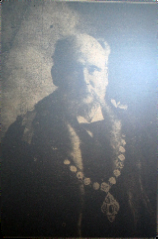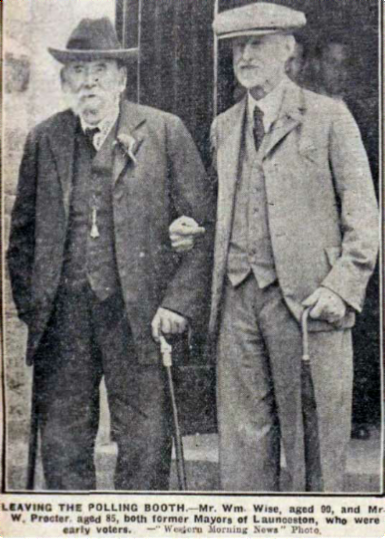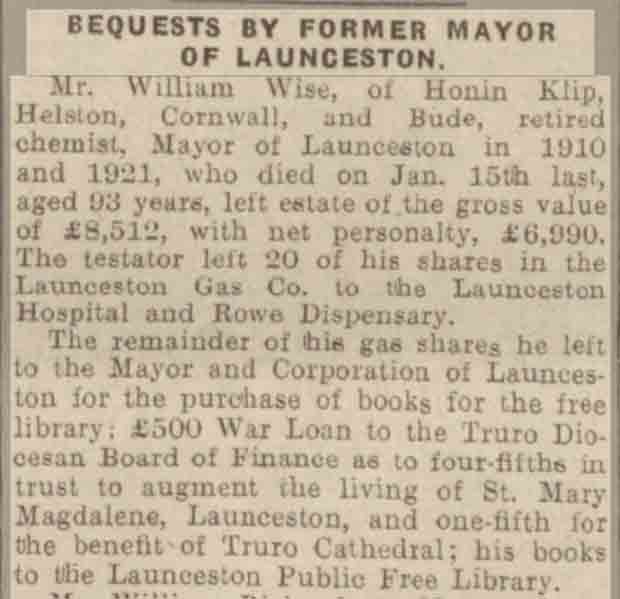.

It was with very great regret that residents of Launceston heard on Tuesday the 15th of January (1935) of the death of Mr William Wise, which took place at Helston that day at the age of 91. Three times Mayor of the Royal Borough, he was one of the best known figures in his native town in which he had spent the greater part of his life. A year or so ago he left Launceston to reside with his niece at Helston, and it was there that he passed away.
Born of humble parentage, he had lived a busy life. As a boy he lived in Kensey Place (then the old workhouse in the parish of St Mary Magdalene), and also in the Noah’s Ark House, which were many years ago demolished when a site was required for the Drill Hall. He was never ashamed to tell of the struggle he had to undergo in his young days. Kind friends, however, notably Rev Childs Clarke, took an interest in him, and they saw that his education was not neglected. He was persuaded to attend night schools, and this did much to mould his future life. He applied himself industriously, and was a credit to those who were interested in him.
When he retired from business many years ago, he was a well-known and capable chemist (He took over the chemist business of John Ching). He first became interested in the business when, from errand boy he became an apprentice to a chemist and druggist, and as time went on he successfully passed the examination to that profession. As soon as he was out of his apprenticeship he left his native town for Helston, but after a few years he returned and eventually succeeded to the business he carried on for a large number of years in Broad Street.
Mr Wise married a Helston lady, and was always a busy man, but nevertheless found time for recreation. He had several hobbies, and perhaps one of the principal ones was his love of botany. He was the proud possessor of a large collection of wild ferns of various kinds, all of which grew in Cornwall.
Cycling was another of his pleasures, and with his friends, the late Mr W. H. R. Atkins, Mr William Slee, and Mr William Geake, many miles would be undertaken, stops at times being made to allow Mr Wise to go hunting for specimens of plants which he carefully deposited in a tin receptacle so made as to strap on to the bicycle, whilst his companions enjoyed a quiet smoke. His desire to obtain specimens of the flora sometimes terminated in a humorous manner. The writer remembers Mr Wise telling him that on one occasion he went to the neighbourhood of Plymstock where, according to a book he had read, a specimen of a certain plant could be found. On arriving, however, although he discovered the place, no specimen could be seen for the obvious reason that the ruthless hand off the builder had covered the site with houses!
A lover of books, Mr Wise took a keen interest in the building of the Passmore Edwards Institute, an institution in which he retained his interest to the last. For years he was an annual subscriber, and his love for flowers was also seen here. He undertook the duty of carefully labelling the wild flowers placed in vases in the reading room by children and others, and many is the time he was asked by people to identify ferns and flowers. Book-binding was another hobby in which he found time to indulge. His press he kept in a spot adjoining the shop counter, and when custom was not brisk, he occupied his time in binding the many periodicals which he weekly or monthly purchased. The number of books presented by him to the Public Library a short time before he left Launceston were all bound by him. Many delightful hours were spent by Mr Wise with his microscope, and he was never happier than when he had a number of young around him.
At the annual Church bazaar the funds were augmented by his arrangement of “penny peeps”. Photography and the making of magic lanterns slides also passed many an interesting hour for him, As an expert with the camera, Mr Wise was always ready to help young beginners with advice. One of his favourite subjects, in addition to the recording of plant life, was the interior of Churches, and he used to produce some really fine lantern slides, which he was delighted to exhibit to his many friends. A sound Churchman, Mr Wise had served in all the lay offices, from chorister to churchwarden. The choral festivals he took a keen delight in, and as a bell-ringer he made the subject of scientific ringing his special delight. He was the oldest member of the Tamar Valley Guild of Ringers, and was proud of the gift made to him of the silver bell which one could see appended to his watch chain. Until quite recent years, he took a pride in being present at the belfry to take part in an early morning peal on special occasions. His interest in scientific change ringing extended to handbells also.
As a Churchman he carried out his duties with zeal, and was rarely absent.
As a lover of flowers the Cottage Garden Society’s affairs naturally claimed his attention and for many years he carried out the secretarial duties. It was undoubtedly owing to his endeavours that the late Miss Pearse gave an endowment, the interest of which was to be given as “Pearse prize money”, and which is annually given to the successful exhibitor. She also gave an endowment, the interest of which was to be used to pay for the ringing of the curfew from St Mary Magdalene Church tower. Up to the age of 87 years, Mr Wise was a playing member of Dunheved Bowling Club.
Politically Mr Wise was a staunch Conservative, and his services could always be relied upon when the party needed them. It was no wonder, then that in time he was chosen to be nominated to represent the Conservative Party in the Town Council elections. This was in 1891, when ratepayers meetings were unknown and it was the custom to conduct municipal elections on political lines. Like many others aspirant for municipal honours, Mr Wise was defeated at the poll many times before in 1905 he succeeded, and continued as a councillor until 1924 when he was elected alderman. To the regret of his fellow councillors and the townspeople he retired in 1929. During his periods of service he was thrice honoured by the town Fathers by being elected Mayor of his native town – 1910/1911, 1911-1912, and again in 1921-1922.
It was during his year of office in 1911 that the King George V Coronation took place, and, as in the case of the Mayor for the year when King Edward VII’s Coronation took place – and who, by the way was a chemist (Mr C. B. Shuker) – Mr Wise received the Royal Command to attend Westminster Abbey to witness the ceremony. He often said that Launceston must have been a Royal Borough from the fact that his seat in the Abbey was next to the Mayor of Windsor. At Launceston on Coronation Day the Mayoress, Mrs Wise, carried out her duties to the utmost satisfaction of the inhabitants. Many still remember that afternoon in the Pennygillam Sports Field when the Mayoress presented the children with boxes of chocolates and medals in honour of the unique occasion.
Mr Wise’s first years of office as Mayor were remarkable from the fact that, at the installation of the electric light; the starting of the compulsory early-closing half-day; celebrations in connection with the centenary of St Mary Magdalene Church; the building of the Drill Hall; and the purchase of the then new – but now out-of-date – steam fire engine, Mr Wise marked the occasion of Mayoralty by the handsome gift of 100 chairs for the Town Hall.
In 1915 Mr Wise sustained a great loss by the death of his wife. He continued, however, with the aid of his niece from Exeter, and carried on his business and also acted as dispenser at the Launceston Infirmary. He also served for many years as a Guardian of the Poor, and was also a director of Launceston Gas Co. Eventually he retired from business and went to reside in Dunheved Road. Here he sustained another blow when his niece (then the wife of Mr S Robbins) died.

their votes in the 1932 North Cornwall by-election.
Daily Mr Wise could be seen walking into the town, but as advancing years crept on, these walks proved too much for him, and although he could manage to walk into the town, he had perforce to make the return journey by car. For a year or so he lived with his niece at Helston, and, as stated, it was here that he passed away to the great regret of his many friends on the 15th of January 1935.
The funeral took place at St Mary Magdalene Church, Launceston, at 3 pm.

Visits: 120
